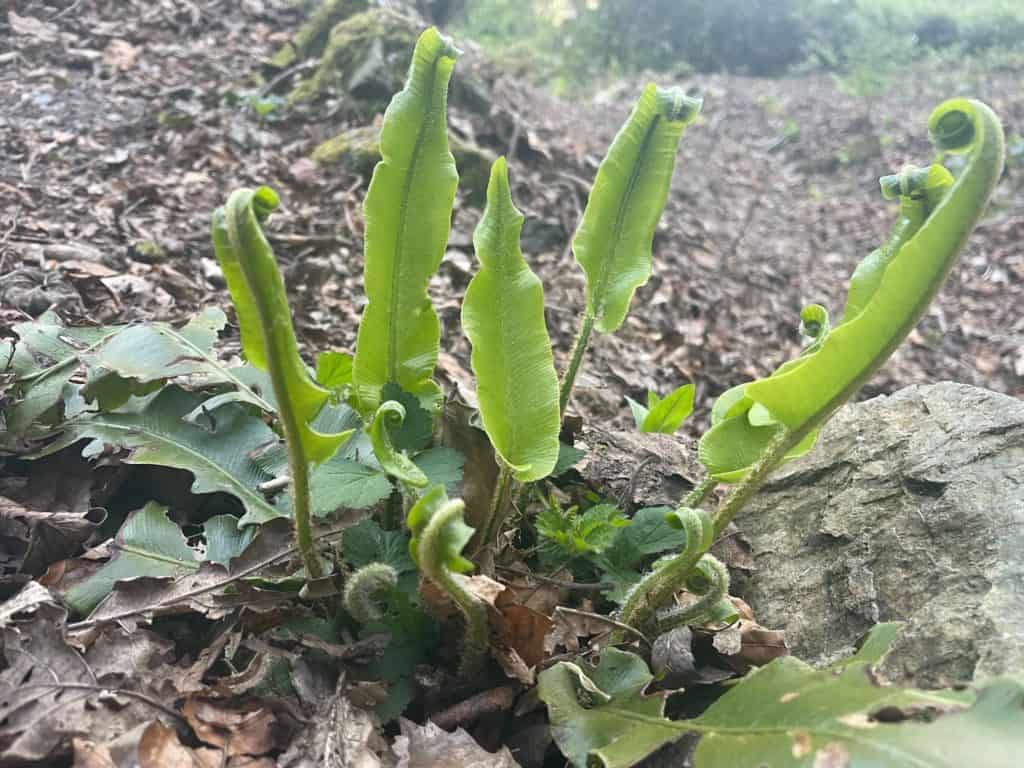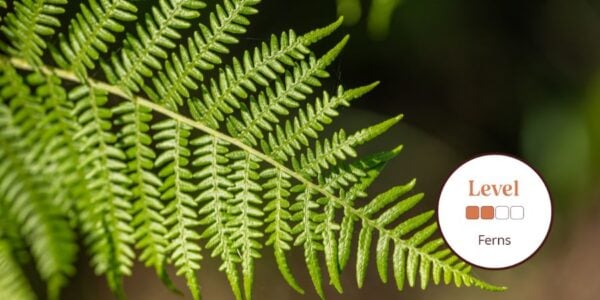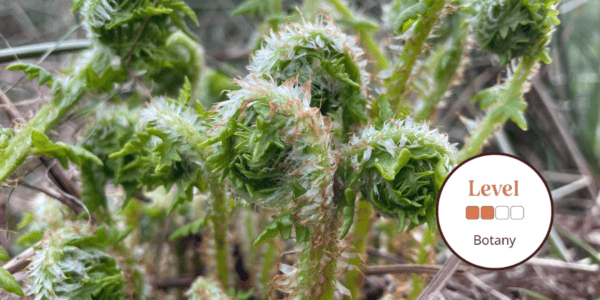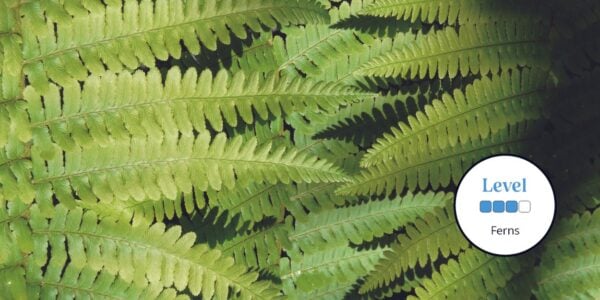This beginner ferns course is a great place to start for those taking their first steps into the world of ferns.
Ferns are a common sight on a woodland walk, but have you wondered what species you are seeing? Ferns are vibrant, non-flowering plants, which reproduce via spores. With a diverse variety of species in the UK, there is much to explore.
This course will include:
- An introduction to fern biology
- An introduction to fern ecology
- An introduction to identifying common fern species



Read More
During this course, you will start by looking at the basics of the biological definition of a fern and their place in the plant kingdom. You will be introduced to the common fern species found in the UK, studying their biology, ecology and key differences. Finally, you will look at basic identification of the most common species you may find and practice identifying them in the field.
Who Should Attend? – Nature enthusiasts, students, rangers, early career consultants and ecologists.
Knowledge Level – Beginner. Level descriptors can be found on the following web-page: Framework and Course Level Descriptors
Prior Knowledge – No existing knowledge or experience is needed for this course, just a willingness to explore and learn.
By the end of the course, you will be able to:
- Describe which groups of organisms are classified as ferns and what makes them different from other plants
- Understand the basics of fern biology including the different stages of fern life cycles
- Describe fern habitats and the environmental conditions
- Describe the key features required for identification and identify most common fern species
- Share this knowledge with friends, family, and fellow volunteers
PLEASE NOTE: There is no accommodation, or meal facilities provided with this course. Refreshments (tea and coffee) will be available. If we are unable to reach viable numbers for this course, we will inform you of the course cancellation 4-5 weeks prior to the course run. We would recommend when purchasing accommodation and/or travel you should take out your own insurance.
Bookings will close if course capacity is reached.
Please email [email protected] if you have any questions.
About the Tutor
Fiona Gomersall
Fiona Gomersall is a trained biology teacher and skilled field botanist. She is currently employed as an ecologist with the Elan Valley Trust.
Henry Miller
I am a botanist working at Kew Gardens on projects relating to the conservation of tropical plants in Uganda as well as producing extinction risk assessments for Ethiopian species. Outside of work I am involved in the Botanical Society of Britain and Ireland and the London Natural History Society, I volunteer with these organisations to record and identify a wide range of plants.
Jeff Duckett
Jeff Duckett is Emeritus Professor of Botany at Queen Mary University of London and a Research Associate at the Natural History Museum. Following his PhD on sex determination in Equisetum he has written over 250 publications on the biology and evolution of ferns and bryophytes. He has run numerous courses for the Field Studies Council at Nettlecombe Court and Preston Montford.
Morag Boyd
Morag Boyd is a countryside professional with 30 years experience working in a range of countryside and conservation professions. In a varied career, she has worked in a variety of roles including countryside ranger in various locations, lecturer in countryside management for Elmwood College in Fife, conservation shepherd for the Scottish Wildlife Trust and now she combines a contract with Scottish Badgers, recruiting and training volunteers for the national Get Sett Scottish Badger Survey with freelance work training teachers to take learning outdoors for Learning Through Landscapes. She also runs her own outdoor nature education business, working with schools and community groups to get children outdoors and learning about nature.
Morag has a broad knowledge of many different aspects of ecology and conservation, with particular interests in badgers, of course, trees and woodland management and botany.
Example Timetable
Timings of this course vary between locations, so please carefully check the times on the course run (the section where you can add the course to your basket towards the bottom of this page). There will be a one-hour lunch break during the day. Lunch is not included so please bring your own food. Refreshments (tea and coffee) will be provided.
What's Included
The course has been carefully created by expert tutors and educators to help you build your knowledge and apply it within the field surrounded by like-minded individuals.
The course includes:
- Classroom learning covering the theory of the species
- Field excursions to apply new knowledge
- Expert tuition for which the Field Studies Council is renowned
- Clear objectives and progression
- In-course transport
- Refreshments (tea and coffee)
You can rest assured that the absolute best content from an expert in environmental education will be provided. In choosing a Field Studies Council course, you will be joining thousands of people who learn with us each year.
Bursaries and Subsidies
Student Discount
This course is eligible for a student discount. If you are a current student, please use discount code BioStudent20 at checkout for 20% off all Biodiversity courses.
Natural History Bursaries
There are a number of natural history bursaries available to help with the cost of your course. To find out if you and your chosen course are eligible, read more here.
Before You Attend
What to Bring
- Notebook and pencil
- Lunch and refreshments
- Sensible footwear and clothing for being outdoors
- Small bag to carry personal items
The following is not mandatory but may help you during this course:
- Hand lens
Recommended Literature
Some examples of the following guides will be available during the course, but you may find it beneficial to bring your own copy.
When you book this course, you will receive a discount code for the Field Studies Council recommended guides below.
There will be a member of staff with first aid training and access to a first aid kit on site. If you have special medical or access requirements, please let us know as soon as possible so we can plan the course.
Opportunities to attend this course
-

Sat 15, June 2024 10:00 - 17:00
The venue is unable to offer accommodation with this course, please book local accommodation if you require overnight stays and ensure you take out the appropriate insurance.
-

Sat 10, August 2024 10:00 - 17:00
Please note that this course has a higher fee because it includes in-course transport to field sites away from the centre. If you would like to book accommodation and meals at Preston Montford Centre, please email [email protected]. Please note the Centre may not be able to guarantee accommodation and meals during this course.
-

Sat 10, August 2024 10:00 - 17:00
The venue is unable to offer accommodation with this course, please book local accommodation if you require overnight stays and ensure you take out the appropriate insurance.
No current dates for this course? Click here to view all the upcoming Natural History courses.
Progress Your Learning
This is a training course from the Field Studies Council, delivered by expert tutors with an approachable learning style. After attending this course, you may like to progress your learning with further relevant courses or branch out into other areas of natural history. The Field Studies Council offers both online and in-person courses, so you can choose the learning style that suits you best.
The course gives you the opportunity to immerse yourself in a new subject and acquire novel skills. Our online portal gives you time to study at your own pace and fit the lessons around your own schedule.
If you have any questions about our courses please check our Frequently Asked Questions or email [email protected].
Group Bookings Made Easy
If you have a group of 10 or more individuals wanting to complete one of our courses, our team are available to discuss your options – from discounts to private team courses. Find out more!
You can rest assured that the absolute best content from an expert in environmental education will be at your fingertips. In choosing a Field Studies Council course, you will be joining thousands of people who learn with us each year.



